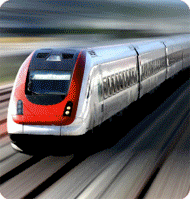| Suitability | Course Type/Stage of Career | |||
| Type of Participant | Introductory From day 1 (New Start) | Basic Early Career | Advanced Developing Career | Specialist Specifically Focused |
| Enthusiast |
• |
|||
| New rail industry employee |
• |
|||
| Generalist or technologist in early career |
• |
• |
||
| Developing technologist in defined roles |
• |
• |
• |
|
| Developing specialist |
• |
• |
• |
|
| Specialist formalising training |
• |
• |
||
Introductory Courses
(Terminology and function of systems)
Courses in the Introductory Category are designed for new-starts in the rail industry and have broad appeal to all rail-related staff: generalists and enthusiasts — technical or not. The courses are designed to give participants an understanding of the core terminology, function of systems and introduction to the rail industry. Introductory courses are delivered on-line with appropriate off-line activities. Introductory course participants should have an improved understanding of the rail industry to the point where they will more rapidly become productive in their job.
Basic Courses
(Types of systems, components, basic operation and rail acronyms)
Courses in the Basic Category are designed for people who have recently started a technical role. These courses build on the Introductory courses and develop system knowledge more comprehensively by exploring the types of systems, their components and their operation. Most knowledge components are delivered on-line; however, there may be use of webinars, tutor interactions, project work and in some cases short intensives to enable the practical components of competency to be developed. These courses cover railway content that is generally not available in other training courses.
Advanced Courses
(Detailed operation, read and follow diagrams, plans, etc / service / adjust / install / operate / maintain)
Courses in the Advanced Category are designed for experienced technical staff, usually to formalise their training and development. These courses cover key workplace competencies for the identified roles and as such, they require a workplace mentor. The mentor’s role is to guide participants in how your company uses its tools and processes to achieve outcomes. There are multiple on-the-job activities to develop the required workplace competencies. We will support learning with the use of workplace project work, group tutorials and other supplements to ensure sound preparation for the workplace competencies.
Specialist Courses
(Design diagrams, plans, etc. / check installations / test installations / fault find)
The Specialist Category courses are designed for specialist technical staff, usually to extend formal technical training and development from Advanced courses. Knowledge components of the courses will be delivered on-line however these courses can only be attempted where an approved and qualified workplace assessor is identified. The assessor collaborates with the participant in the workplace to ensure that workplace activities lead toward correct competency development. All activities are appropriately shielded to protect in-house IP and commercial confidentiality. The assessor will finally determine that all demonstrated competencies are to rail industry standards.
Assessment Services
(Computer-based is the most objective method of assessing, grading, analysing and certifying knowledge and understanding. Cost-superior to human processing.)
The Assessment Services provided by this site enables high-quality objective assessment and testing of knowledge and understanding. Computer-based assessment can provide randomly-selected questions; randomly-selected answer order plus a variety of analysis tools (distractor analysis, ranking analysis, etc.). A prime advantage of this service is the cost-effectiveness using computer processing of assessment, grading and analysis over the cost of staff providing the same.
To see the features of our courses, click here
To see a list of all of our courses, click here


